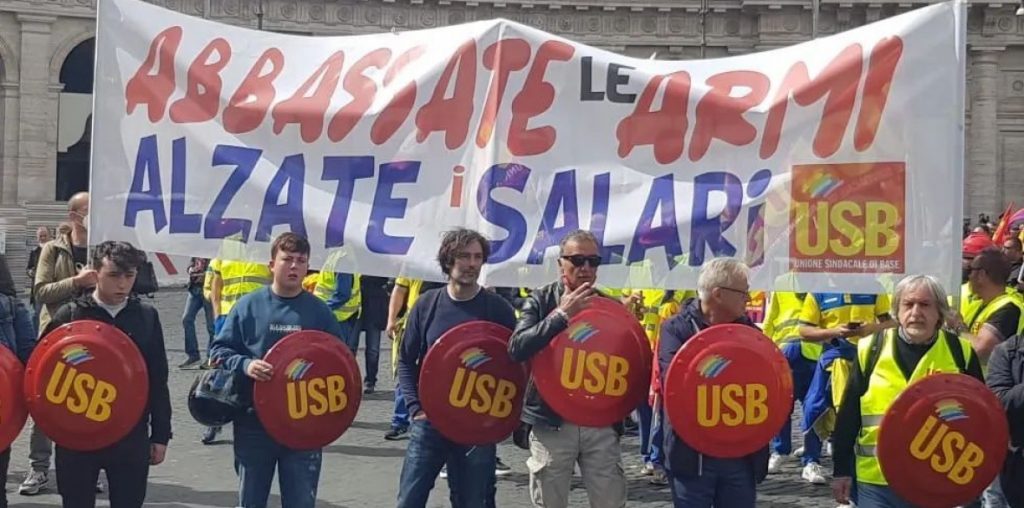Across Italy, on Friday, May 20, dozens of demonstrations, blockades, and pickets were held — all part of a strike called by the Confederazione Unitaria di Base (CUB, United Rank-and-File Confederation) and the Sindicato Generale di Base (SGB, General Rank-and-File Union) and then signed on to by the rest of the rank-and-file unions. These actions centered on two demands: ending the war in Ukraine and easing the rising cost of living, which is hitting the working class and poor hard in Italy, as it is elsewhere. The strike represents an initial step in the critically important fight to build an anti-war movement with a class-struggle perspective.
“Lower the guns, raise wages” was the central slogan of the day. The actions set an important example for the labor movement in other European Union and NATO countries, where most of the Left has yet to launch mass mobilizations against the war — in Naples alone there were three separate demonstrations.
Still, the one-day strike was limited. It failed to involve broader sectors beyond a part of the rank-and-file unions, some sectors from the social movements, and Left groups not represented in parliament. There was little effort to build assemblies or put forth and discuss a perspective for building a broad, united mobilization for peace and against the high cost of living — one based on the class struggle of workers themselves. It was not what is needed at this moment when the attack on our living conditions and the rise in militarism is so strong: a break with the routine, conservative approach that separates the unions’ economic struggle from the political struggle. Even within the rank-and-file unions, this perspective persists — and contributes to the failure of these unions to activate their own members. For example, in Rome, where the Unione Sindicale di Base (USB, Base Union) has strong roots and there has been broad support of the USB and the CUB in the Alitalia dispute,1Translator’s note: The Italian airline Alitalia ceased operations in the latter part of 2021 after years of losses and dependency on government aid. Its successor company, Ita, has refused to negotiate with the trade unions, which are seeking a collective agreement for the remaining employees. a demonstration in the city failed to bring out even 2,000 people. Workers from these fighting sectors were in the minority.
Logistics Companies at the Center of the Struggle
A positive aspect of the day was the blockades and pickets at workplaces, especially those in the logistics sector. This was particularly widespread in the Northeast, where pickets were led by ADL Cobas.2Translator’s note: ADL Cobas is a union that focuses on organizing migrant workers in logistics companies, primarily in the Veneto region. ADL stands for Associazone per i Diritti dei Lavoratori, or Association for Workers’ Rights; Cobas is the Confederazione dei Comitati di Base (Confederation of Rank-and-File Committees).About 100 workers from SI Cobas, the sister union of ADL Cobas, along with other activists, gathered at the front gate of DHL Pomezia, just outside Rome, to block the unloading and loading of goods (particularly from the Nespresso and Buffetti companies). This was in solidarity with four workers recently fired after outsourced warehouse work was canceled. These firings were clearly used as an anti-union threat to other workers, considering that the German multinational is infamous for its determination to keep every combative union from getting even a small toehold in its warehouses.
The picket went smoothly after an initial attempt by DIGOS3Translator’s note: DIGOS stands for Divisione Investigazioni Generali e Operazioni Speciali (General Investigations and Special Operations Division), an Italian police agency charged with investigating “sensitive” cases involving terrorism, organized crime, kidnapping, and extortion, but that has increasingly been used in labor disputes. and the police to break up the demonstration, as well as pressure from some managers who were leaving the warehouse during the early-morning shift change. Nevertheless, workers from warehouses throughout the province of Rome protested from 8:00 a.m. to noon, when loading and unloading ended. Several truck drivers expressed their solidarity with the action.
A second union delegation demonstrated in Rome’s Piazza della Repubblica to support the actions by other rank-and-file unionists.
Toward a United, Radical, Class-Conscious Movement
Friday’s day of strikes denounced the profound connection between the economic attacks that people in Italy are suffering and the war policies of the government and NATO, which have responded to the Russian invasion of Ukraine by increasing military spending and making fiery pronouncements all focused on confirming NATO’s supremacy as an alliance of imperialist powers, one that exploits and oppresses people far beyond the national borders of its members.
Brutal, provocative raids were carried out against young activists in Milan who had “dared” to demonstrate against the Russian giant Gazprom (which has just signed a new agreement with Eni, the Italian multinational oil and gas company; so much for the “clash of civilizations”). This underscores that there is no choice between the two camps of capitalists who mobilize entire states and armies to plunder in the interest of the greatest possible profit, competing but always united against the working class and the youth.
All this brings to the fore the challenge issued by the GKN factory collective and the “Insorgiamo” movement: we cannot just sit around and wait until the end of summer. The time is now to build a “convergence” focused on establishing a united, radical, class-conscious movement against the war and the high cost of living, with common demands against the policies of the government of Prime Minister Mario Draghi. Such a movement can bring together the sectors that have already been waging struggles in the past year, including the students in Milan, students in Florence who have come out in solidarity with the GKN workers, and the “La Lupa” movement.4Translator’s note: In January, an 18-year-old student named Lorenzo Parelli died after being hit by a heavy metal beam while working at a factory in the small northern Italy town of Lauzacco. He was there as part of his alternanza scuola-lavoro (school-work alteration) internship, which is mandatory for high school students. In late 2021 the “La Lupa” movement began (lupa means “she wolf” in Italian; the movement refers to Rome’s founding myth of Romulus and Remus, who are discovered by a female wolf). Students began occupying high schools in Rome and demanding safer Covid-19 measures, smaller class sizes, and repairs to crumbling school infrastructure. Since then, students across Italy have mobilized to protest the death of Parelli and the program that he was forced into.
The first important event in this convergence will undoubtedly be the national mobilization called for June 2 in Coltano, in the province of Pisa, against the construction of a military base inside a nature reserve. But there will be many other occasions, such as the June 4 march in Rome, called by the Kurdish community, against the invasion of Iraqi Kurdistan by the Turkish army — a tragedy that is unfolding with little attention. It is a reminder that NATO and international diplomacy are rife with cynicism; they have “untouchable” partners like Turkish president Recep Erdoğan, a butcher who exploits his veto power in NATO to enjoy free rein to massacre the Kurds and brutally persecute the Kurdistan Workers’ Party (PKK), still internationally labeled a “terrorist” organization.
It will take a powerful mobilization of our class at the European and international levels to stop the wheels from turning in this system of exploitation, environmental devastation, and murderous militarism to which capitalism condemns us.
First published in Italian on May 21 in La Voce delle Lotte.
Translation by Scott Cooper
Notes
| ↑1 | Translator’s note: The Italian airline Alitalia ceased operations in the latter part of 2021 after years of losses and dependency on government aid. Its successor company, Ita, has refused to negotiate with the trade unions, which are seeking a collective agreement for the remaining employees. |
|---|---|
| ↑2 | Translator’s note: ADL Cobas is a union that focuses on organizing migrant workers in logistics companies, primarily in the Veneto region. ADL stands for Associazone per i Diritti dei Lavoratori, or Association for Workers’ Rights; Cobas is the Confederazione dei Comitati di Base (Confederation of Rank-and-File Committees). |
| ↑3 | Translator’s note: DIGOS stands for Divisione Investigazioni Generali e Operazioni Speciali (General Investigations and Special Operations Division), an Italian police agency charged with investigating “sensitive” cases involving terrorism, organized crime, kidnapping, and extortion, but that has increasingly been used in labor disputes. |
| ↑4 | Translator’s note: In January, an 18-year-old student named Lorenzo Parelli died after being hit by a heavy metal beam while working at a factory in the small northern Italy town of Lauzacco. He was there as part of his alternanza scuola-lavoro (school-work alteration) internship, which is mandatory for high school students. In late 2021 the “La Lupa” movement began (lupa means “she wolf” in Italian; the movement refers to Rome’s founding myth of Romulus and Remus, who are discovered by a female wolf). Students began occupying high schools in Rome and demanding safer Covid-19 measures, smaller class sizes, and repairs to crumbling school infrastructure. Since then, students across Italy have mobilized to protest the death of Parelli and the program that he was forced into. |











